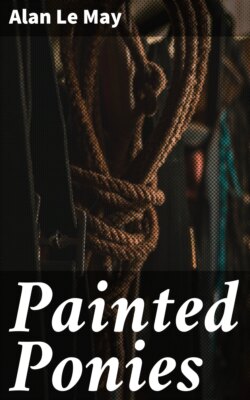Читать книгу Painted Ponies - Alan Le May - Страница 11
На сайте Литреса книга снята с продажи.
3
ОглавлениеA slender thread of smoke, as vertical in the still air as if it had been suspended from above, was discovered by the horizontal rays of the rising sun, and etched out into a faint cobwebby line, lighter than the dark northern sky against which it lay. Guided by this thread-like signal, Slide Morgan swerved to the north, stepping painfully in his high-heeled boots. A gawky sixty-foot shadow hobbled at his side, writhing its way over the uneven prairie floor.
As he advanced the smoke-beacon seemed gradually to recede, eluding his efforts to approach it; so that an hour was spent in uncomfortable walking before he topped a little rise, and came suddenly upon the source of the dwindling smoke. Morgan took two long steps, then stopped short, uncertain.
Blinking in the sunlight of the June morning lay a little irregular lake perhaps a quarter of a mile in width, margined with thick stands of reeds and sedges; such a place as wild geese and ducks would choose to rest upon in flight seasons. Beside the lake, backed by a brush-clothed knoll, a dozen tall cottonwoods stood in a straggling clump, and among them, at their feet, two log buildings hugged the ground.
They were small and plain, these cabins; but cheerful in the gilding sunshine, and very orderly and neat. The larger of the two cabins was of two stories; or rather, of a story and a half, there being enough room for sleeping quarters under the roof. The other was a low hut, probably a bunkhouse, suitable for the accommodation of five or six men.
The weathered remnants of a hay stack were protected by a stake and rider fence; a number of plump hens scratched in its edge. Far out here on the rugged, tameless prairie the casual hens added an air of comfortable friendliness to the place, as if it were a snug farmstead, instead of in truth a precarious outpost where men watched and waited, riding between livestock and hostile Indians until better days should come.
Beyond was a small shelter, scarcely more than a windbreak, probably used as a stable for the night horses.
Small as it was, the little camp had an atmosphere of satisfying completeness such as Morgan had not expected to find in the work of Jake Downey. He had thought of Downey’s outpost as a harum-scarum, makeshift stand, characterized by ingenious provisions for the minimizing of work, and a prosperous outpouring of tin cans. Then, as they came closer, he sighted another astonishing incongruity.
At the foot of the larger cabin lay a little strip of tended earth, bordered with stones, and gay with the pink and green and purple of—flowers.
“Mister,” said Morgan to himself, “this ain’t it.”
Again a queer sense of loneliness came into Morgan, the sensation he always felt when after an interval he approached a place where people were. For among people Slide Morgan felt awkward, ill-adapted. His friends had been few, and such of them as he had known were men like Jake Downey, outcrops of the prairie, like himself.
He knocked on the jamb of the open door, and there immediately appeared in it—a girl.
“Mo’nin’,” she said gravely.
Slide Morgan reassembled himself. “Mornin’, ma’am. I don’t reckon this is Jake Downey’s outfit, is it?”
“This is John Chase’s ranch,” the girl told him in a Texan drawl.
She looked to Morgan to be seventeen at the most; but in this his judgment fell short by a year or so. He thought her face beautiful, though this, too, was perhaps an inaccuracy. It was a face of gently rounded lines, with quiet lips, and smiling eyes of a hazel color, as if the brown-green of the sage at certain times were shot through with flecks of sunlight. Her hair was of the color of misting rain when the sun faintly touches it with a breath of gold. Probably cowboys would have described it as ash-blonde.
“Jake Downey’s camp is about twelve miles south,” she concluded.
“Yes, ma’am. I reckon.”
Morgan shifted uneasily before the girl’s upturned eyes, for they were as unlike the eyes of the bar room girls he had known as they were unlike the eyes of men.
“My horse fell,” he told her. “I was ridin’ up this way, headin’ fer Hickory Lookout, an’ I was sleepin’. So he got loose from me,” he finished lamely.
“He did?” The girl’s eyes were beginning to smile, and Slide reddened.
“Yes, ma’am. He did. An’ I was wonderin’ if you could loan me a horse while I ride over to Jake’s Hickory Lookout an’ get mine.”
The girl looked vague. “Was the hawse aimin’ to meet you at Hickory Lookout?”
“Why, it was a Hickory Lookout horse,” Slide explained. “An’ probably the boys will have picked him up—”
“I guess we can fix you up,” said the girl. “Prob’ly pa will be glad to catch you up a hawse when he comes in. But you’ll have to wait fo’ him. Had breakfast?”
“No’m.”
“I’ll fry you some cakes. What did you say yo’ name was?”
“Morgan. Benjamin Morgan, gener’ly called Slide.”
“Well, Mo’gan, any good at imitations?”
“Why,” Slide floundered, “what kind?”
“Why, actin’ like things—different things.”
“I can whistle like a wapiti.”
“Won’t do,” she told him solemnly. “Wapitis can’t come in the kitchen. If yo’ goin’ to eat in my kitchen you’ve got to give a imitation of a first-class gent.”
The words came incongruously in her low drawl. Slide stared, completely at loss. “Guess I’ll ride on,” he decided.
“On what?” the girl demanded, turning away.
